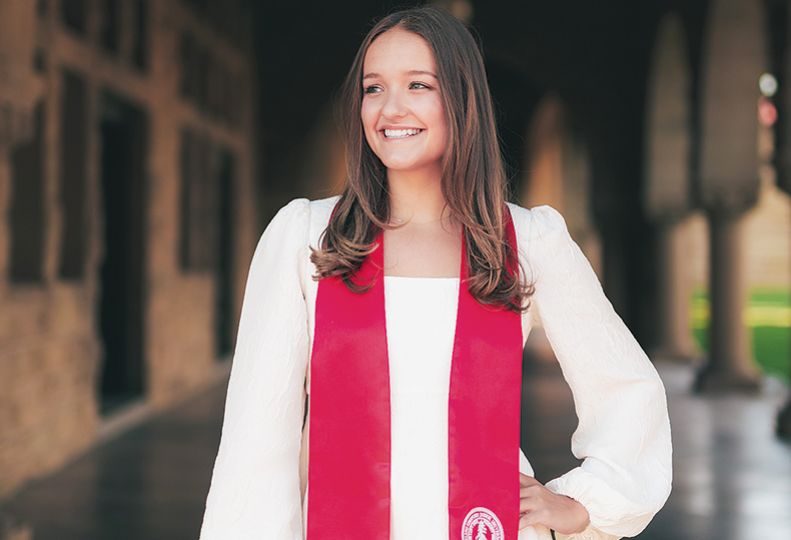
Home » Whatever Happened With: Brooke Martin and iCPooch
Whatever Happened With: Brooke Martin and iCPooch
Company founder sticks with startup community, joins venture capital firm

June 16, 2022
Ten years ago, when she was 12, Brooke Martin invented a device that let dog owners video chat with their pets and give them treats remotely.
The company that was formed around that invention, iCPooch, exploded in popularity, but fell quickly. It was shut down in 2017, but Martin has kept her entrepreneurial drive alive.
Martin, now 22, graduated last week from Stanford University with a master’s degree in management science and engineering. She’s now working for Menlo Park, California-based Floodgate Fund LP, a venture capital company co-founded by Ann Miura-Ko and Mike Maples.
Martin says Miura-Ko pioneered women’s roles in venture capital.
“It’s cool to get to know her,” says Martin, speaking from Northern California where she now resides, but still uses a phone with a 509 area code.
Floodgate specializes in pre-seed and seed-round investing, she says, adding, “We’re the first check in and first believers in entrepreneurs with their first stages of ideas.”
In her current role, Martin works with younger founders, supporting them with resources and mentorship.
“I know what it’s like to be a young first-time founder,” she says. “I’m grateful for people who took a chance on me.”
She says Stanford was her long-time dream school that was made more realistic when she started working on iCPooch and learning about entrepreneurship with support from her father, Chris Martin, and Spokane angel investor Tom Simpson.
As previously chronicled in the Journal, iCPooch won Spokane’s Startup Weekend in September 2012. Startup Weekend was the predecessor to the present-day Sparks Weekend, a three-day event in which potential entrepreneurs compete in hopes of turning business ideas into startups.
The win for iCPooch resulted in a team of professionals embracing the concept and helping to further its development.
Within two years, the iCPooch product was brought to market and garnered a lot of attention. It took the top prize in an “Inventions We Love” contest at Geekwire Tech Summit in Seattle, and Martin appeared on the popular reality TV show “Shark Tank” to pitch to the celebrity investors.
Although iCPooch was a commercial success for a time, the company shut down about five years ago.
Citing problems with outsourcing, Martin says, “We would have had to redesign the technology and the device. We did our best to connect existing customers with a competitor that had a similar product.”
A few weeks after deciding to shut down iCPooch, Martin was accepted into Stanford University.
“A door was opening as another closed,” she says.
At Stanford, Martin majored in management science and engineering through the university’s school of engineering.
“I took a lot of computer science, math, and scientific classes and dipped my toes in engineering and business at the same time,” she says.
She earned her undergraduate degree in the height of the pandemic. Because of the pandemic and other factors, she decided to earn a master’s degree in the same department.
Martin capped her Stanford experience with a three-month position as a teaching assistant in Italy through the Stanford in Florence Program, where Tom Byers, who she says is one of the fathers of entrepreneurship education, was faculty in residence.
“I was fortunate to work with him throughout my time at Stanford,” she says. “He needed assistance for the Entrepreneurship and the Renaissance class.”
Some of the class comparisons of Renaissance communities and modern-day innovations reminded her of the entrepreneurial environment she experienced in Spokane, she says, listing the concentration of universities here, the mentorships she experienced, and Spokane’s tight-knit community.
“I was proud of Spokane and how it continues to grow and evolve,” she says. “It was a cool perspective to learn about that.”
She says her entrepreneurial experience in Spokane enabled her to share with other students what she had learned.
“ICPooch probably still is the defining experience of my young life,” she says. “I learned so much from angel investors, patent attorneys, and entrepreneurs in Spokane that gave me strong motivation.”
And while the company is long gone, it still is propped up as a local success story at startup events.
For now, she says, “I’ll stay down here for full-time work. Spending my time supporting others and learning about technology and where things are going has been fulfilling.”
She hasn’t ruled out entrepreneurship in her future.
“I keep a book and write down ideas,” she says. “I think I eventually will go back and start another company.”
Latest News Technology
Related Articles





